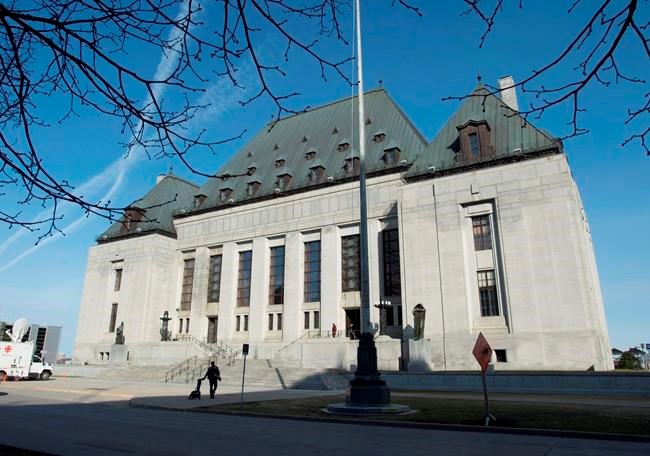OTTAWA — A person accused of breaching bail must knowingly or recklessly violate conditions in order to be found guilty of straying from them, the Supreme Court of Canada has ruled.
In its unanimous decision Thursday, the high court ordered a new trial for Chaycen Michael Zora, who was convicted of failing to comply with police checks while out on bail.
The court also stressed the importance of imposing only necessary bail conditions, saying burdensome ones disproportionately affect the vulnerable and marginalized, including Indigenous people and those living in poverty or with addictions or mental illnesses.
Leo Russomanno, an Ottawa criminal lawyer, welcomed the general recognition of "bail conditions that really just set people up to fail."
It is a reminder that "release is the norm and that onerous conditions should only be applied when it's absolutely necessary," he said.
Zora was charged with a number of drug offences in British Columbia and released on condition he obey a curfew and be at his front door within five minutes of police or a bail supervisor checking on him.
Twice in one week in October 2015, police rang Zora's doorbell but he did not answer.
Zora was charged with two counts of breaching his curfew and two counts of failing to meet the condition to answer the door.
He was acquitted of the alleged curfew breaches as the judge was not satisfied beyond a reasonable doubt that Zora had been outside of his house at the time. However, Zora was fined $920 after being found guilty on the two counts of failing to appear at the door for compliance checks.
Zora had said it was difficult to hear the doorbell from where he slept, and that he was undergoing methadone treatment and withdrawal from his heroin addiction, which made him very sleepy.
Zora had no further problems complying after changing where he slept in his home and setting up an audio-visual system to help alert him to future police checks.
He unsuccessfully challenged his convictions for the police-check violations in the B.C. Court of Appeal, prompting his appeal to the Supreme Court.
A new trial is needed to address whether Zora knowingly or recklessly breached his conditions, the high court said.
Parliament did not intend for criminal sanctions to be the primary means of managing any risks or concerns associated with people released on bail, the Supreme Court added.
Such concerns should be managed by setting conditions that are minimal, reasonable, necessary, least onerous and sufficiently linked to the risk the accused person poses.
Only conditions that target the person's risk in relation to flight, public protection and safety, or maintaining confidence in the administration of justice are necessary, the high court said.
A conviction for breaching bail has profound implications for the liberty of the accused, including imprisonment even if the individual is acquitted of the underlying charge, the court added.
"Breach can lead to serious legal consequences for the accused and the large number of breach charges has important implications for the already overburdened justice system," Justice Sheilah Martin wrote on behalf of the court.
"Before transforming bail conditions into personal sources of potential criminal liability, judicial officials should be alive to possible problems with the conditions."
The British Columbia Civil Liberties Association said the decision was "an important step in ending punitive bail conditions as a revolving door to the criminal justice and prison systems."
This report by The Canadian Press was first published June 18, 2020.
Jim Bronskill , The Canadian Press
Note to readers: This is a corrected story. An earlier version said Zora was initially convicted of both curfew and police check violations.



